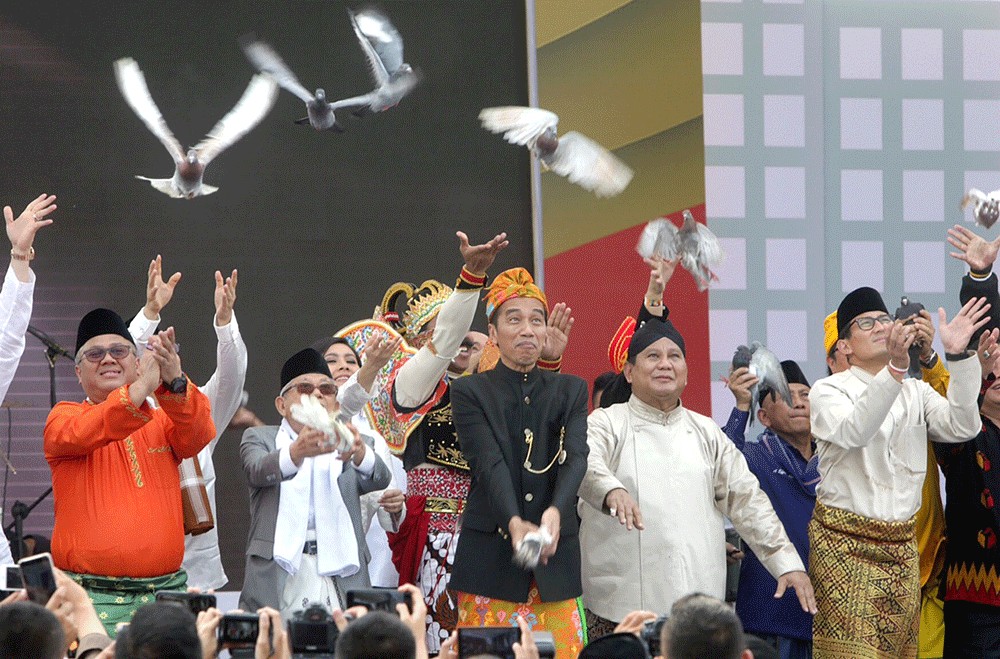Centered on economy
The advantage of the incumbent candidate is that as the ruling government, Jokowi’s camp is practically campaigning every day.
Change Size
 Give peace a chance: President Joko “Jokowi” Widodo (center), who is running for a second term, and his running mate Ma’ruf Amin (second left), along with presidential candidate Prabowo Subianto (second right) and his running mate Sandiaga Uno (right), release pigeons during a peace declaration for the 2019 election campaign at the National Monument in Jakarta on Sunday. With the declaration, the campaign
period for the presidential election, scheduled for April next year, offi cially kicked off , pitting Jokowi once more against his opponent in the 2014 election. (The Jakarta Post/Wendra Ajistyatama)
Give peace a chance: President Joko “Jokowi” Widodo (center), who is running for a second term, and his running mate Ma’ruf Amin (second left), along with presidential candidate Prabowo Subianto (second right) and his running mate Sandiaga Uno (right), release pigeons during a peace declaration for the 2019 election campaign at the National Monument in Jakarta on Sunday. With the declaration, the campaign
period for the presidential election, scheduled for April next year, offi cially kicked off , pitting Jokowi once more against his opponent in the 2014 election. (The Jakarta Post/Wendra Ajistyatama)
W
e can rest assured by the pledges made by the two presidential candidates and their camps that they will not politicize religion, race, ethnicity and inter-group rivalries in their campaign for the April 17, 2019 presidential and legislative elections.
Since identity politics will no longer be an issue, we assume that economic issues, notably those directly related to the interests of the common people, will be the center of the campaigning circuit.
It has been a month since the campaigning period officially started, but we have yet to hear the economic concept or ideas of presidential candidate Prabowo Subianto, who will challenge incumbent President Joko “Jokowi” Widodo. What we have so far been served is mostly political noise as Prabowo’s campaigners shout diatribes at what they see as the main shortcomings of Jokowi’s economic management.
They scorn and ridicule the various economic policies of the incumbent government without offering a coherent economic platform and sensible ideas on how to correct the policies that they consider misguided. They attacked the government’s policy of still allowing the import of rice and other food commodities but have yet to provide a candid diagnosis of the problem and how to raise domestic production.
They criticized the failure to significantly increase exports and ridiculed the government for what they see as its reckless borrowing, but they mislead the public by using only the nominal value as an indicator and not the debt-to-gross domestic product (GDP) ratio as a parameter for sustainable debt management.
We actually long for a comprehensive briefing on an alternative economic development concept from the Prabowo camp on how to cope with the country’s short-and medium-term problems, ranging from controlling inflation and the current account deficit, reducing dependence on fuel imports and boosting investment in labor-intensive industries, to improving the skills of the labor force and reducing the wide inequality in income and wealth.
The advantage of the incumbent candidate is that as the ruling government, Jokowi’s camp is practically campaigning every day. The people can easily see and feel the results of its macroeconomic management on how it delivers public service. To put it briefly, Jokowi has a track record to show off.
Hopefully, the Prabowo camp will use the next six months to propagate concept and ideas on how he will lead and manage the economy if he wins the election next April. We really need a comparative concept to enable us to make a better judgment of the Jokowi camp.
In the meantime, we hope that despite the increasing pressures of short-term political interests in the run-up to the election, the Jokowi government will maintain its macroprudential management.
Past experiences, not only in Indonesia but also in most countries, have shown that it is much more difficult to keep up macroprudential policies in an election year as politicians put more pressure on regulators to shape policies in their own short-term — and often misguided — interests.








